Economic Impact of Covid on UK: Government and Bank of England Responses and Likely Impacts of Brexit
VerifiedAdded on 2023/06/18
|13
|4028
|72
AI Summary
This report analyzes the main economic impact of Covid-19 on the UK economy, major economic responses of the government and Bank of England, and likely impacts of Brexit on the economy of the UK. It covers the impact of Covid-19 on the UK economy, major economic responses of the government of the nation and their implications on the economy, major responses of the financial institution and their implications on the economy of the country, and likely impacts of Brexit on the nation’s economy.
Contribute Materials
Your contribution can guide someone’s learning journey. Share your
documents today.
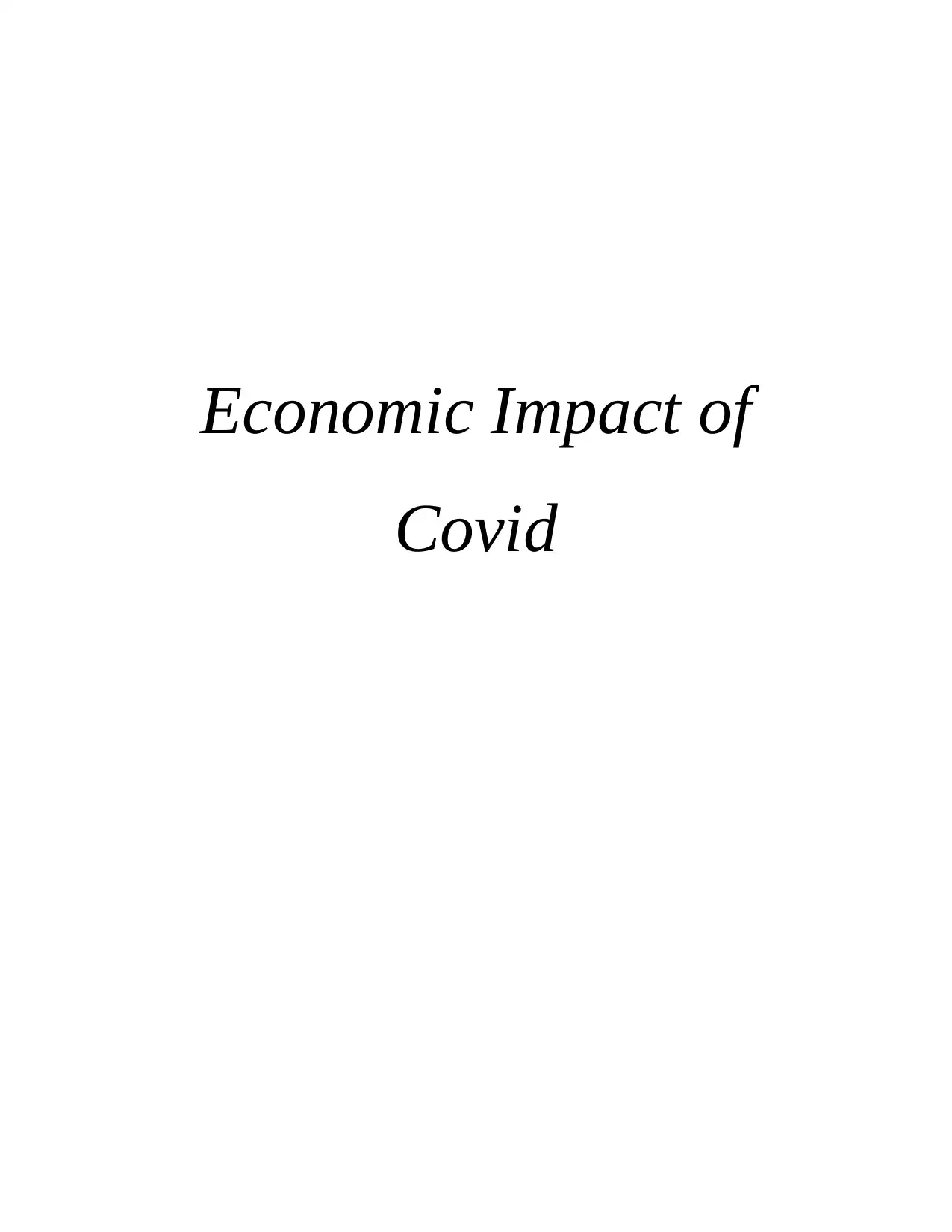
Economic Impact of
Covid
Covid
Secure Best Marks with AI Grader
Need help grading? Try our AI Grader for instant feedback on your assignments.
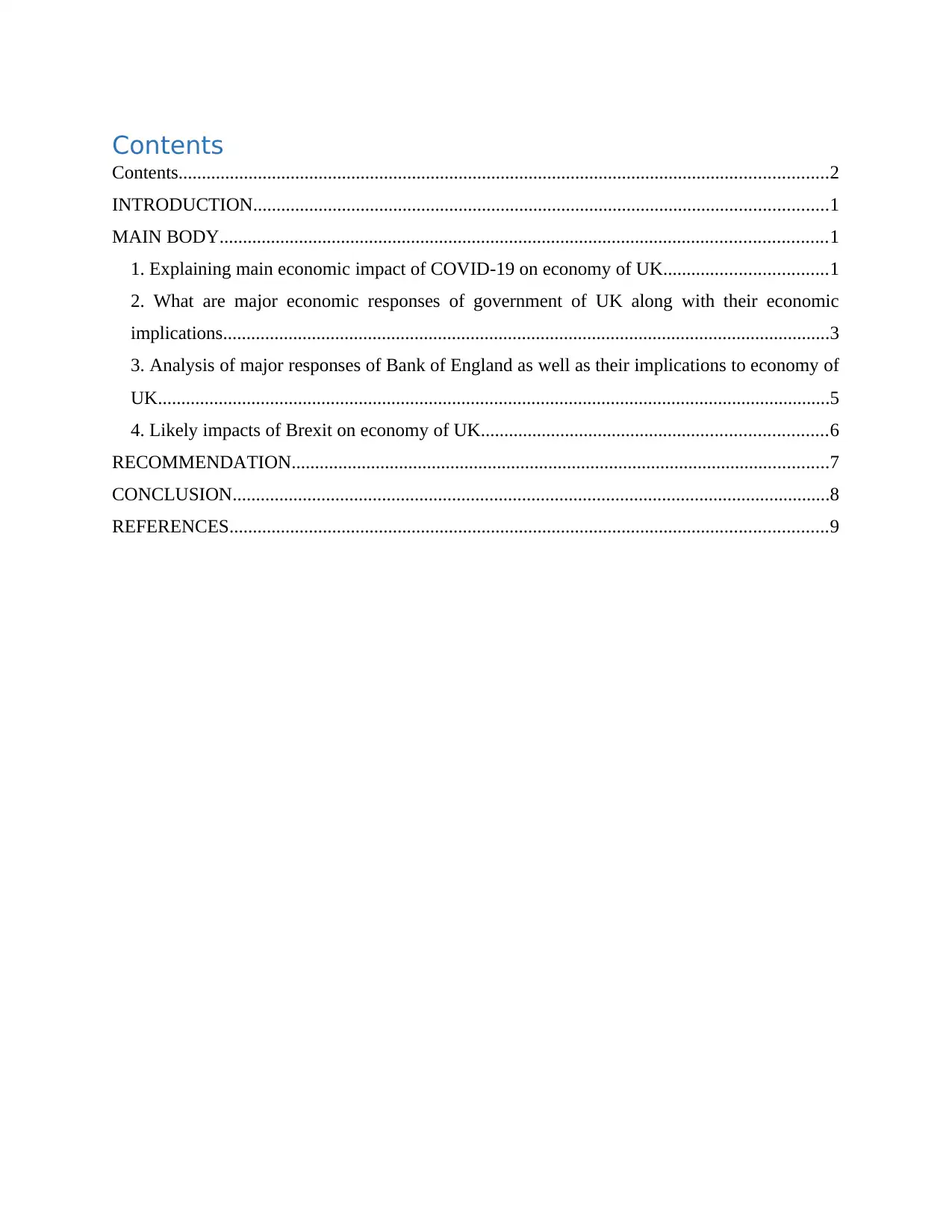
Contents
Contents...........................................................................................................................................2
INTRODUCTION...........................................................................................................................1
MAIN BODY..................................................................................................................................1
1. Explaining main economic impact of COVID-19 on economy of UK...................................1
2. What are major economic responses of government of UK along with their economic
implications..................................................................................................................................3
3. Analysis of major responses of Bank of England as well as their implications to economy of
UK................................................................................................................................................5
4. Likely impacts of Brexit on economy of UK..........................................................................6
RECOMMENDATION...................................................................................................................7
CONCLUSION................................................................................................................................8
REFERENCES................................................................................................................................9
Contents...........................................................................................................................................2
INTRODUCTION...........................................................................................................................1
MAIN BODY..................................................................................................................................1
1. Explaining main economic impact of COVID-19 on economy of UK...................................1
2. What are major economic responses of government of UK along with their economic
implications..................................................................................................................................3
3. Analysis of major responses of Bank of England as well as their implications to economy of
UK................................................................................................................................................5
4. Likely impacts of Brexit on economy of UK..........................................................................6
RECOMMENDATION...................................................................................................................7
CONCLUSION................................................................................................................................8
REFERENCES................................................................................................................................9

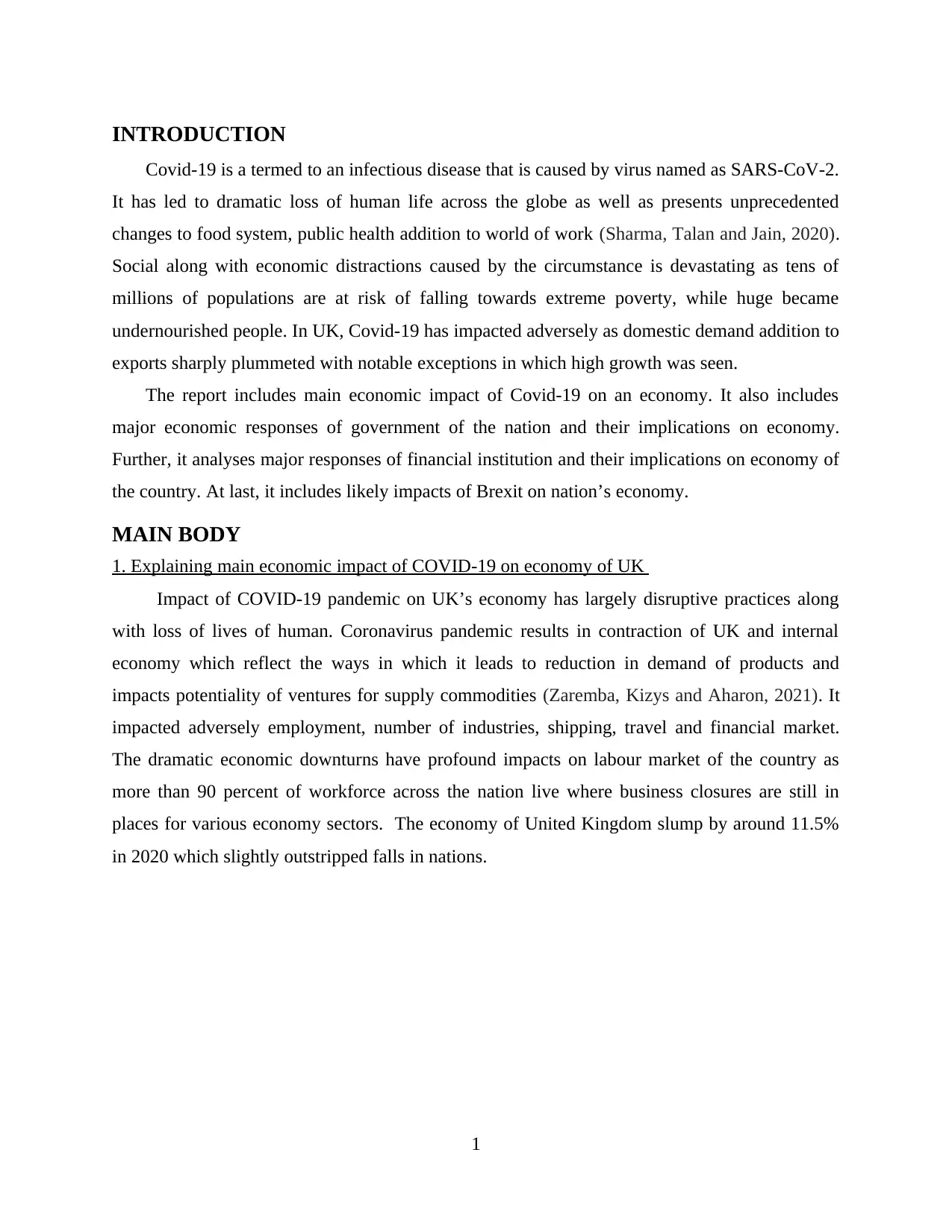
INTRODUCTION
Covid-19 is a termed to an infectious disease that is caused by virus named as SARS-CoV-2.
It has led to dramatic loss of human life across the globe as well as presents unprecedented
changes to food system, public health addition to world of work (Sharma, Talan and Jain, 2020).
Social along with economic distractions caused by the circumstance is devastating as tens of
millions of populations are at risk of falling towards extreme poverty, while huge became
undernourished people. In UK, Covid-19 has impacted adversely as domestic demand addition to
exports sharply plummeted with notable exceptions in which high growth was seen.
The report includes main economic impact of Covid-19 on an economy. It also includes
major economic responses of government of the nation and their implications on economy.
Further, it analyses major responses of financial institution and their implications on economy of
the country. At last, it includes likely impacts of Brexit on nation’s economy.
MAIN BODY
1. Explaining main economic impact of COVID-19 on economy of UK
Impact of COVID-19 pandemic on UK’s economy has largely disruptive practices along
with loss of lives of human. Coronavirus pandemic results in contraction of UK and internal
economy which reflect the ways in which it leads to reduction in demand of products and
impacts potentiality of ventures for supply commodities (Zaremba, Kizys and Aharon, 2021). It
impacted adversely employment, number of industries, shipping, travel and financial market.
The dramatic economic downturns have profound impacts on labour market of the country as
more than 90 percent of workforce across the nation live where business closures are still in
places for various economy sectors. The economy of United Kingdom slump by around 11.5%
in 2020 which slightly outstripped falls in nations.
1
Covid-19 is a termed to an infectious disease that is caused by virus named as SARS-CoV-2.
It has led to dramatic loss of human life across the globe as well as presents unprecedented
changes to food system, public health addition to world of work (Sharma, Talan and Jain, 2020).
Social along with economic distractions caused by the circumstance is devastating as tens of
millions of populations are at risk of falling towards extreme poverty, while huge became
undernourished people. In UK, Covid-19 has impacted adversely as domestic demand addition to
exports sharply plummeted with notable exceptions in which high growth was seen.
The report includes main economic impact of Covid-19 on an economy. It also includes
major economic responses of government of the nation and their implications on economy.
Further, it analyses major responses of financial institution and their implications on economy of
the country. At last, it includes likely impacts of Brexit on nation’s economy.
MAIN BODY
1. Explaining main economic impact of COVID-19 on economy of UK
Impact of COVID-19 pandemic on UK’s economy has largely disruptive practices along
with loss of lives of human. Coronavirus pandemic results in contraction of UK and internal
economy which reflect the ways in which it leads to reduction in demand of products and
impacts potentiality of ventures for supply commodities (Zaremba, Kizys and Aharon, 2021). It
impacted adversely employment, number of industries, shipping, travel and financial market.
The dramatic economic downturns have profound impacts on labour market of the country as
more than 90 percent of workforce across the nation live where business closures are still in
places for various economy sectors. The economy of United Kingdom slump by around 11.5%
in 2020 which slightly outstripped falls in nations.
1
Secure Best Marks with AI Grader
Need help grading? Try our AI Grader for instant feedback on your assignments.
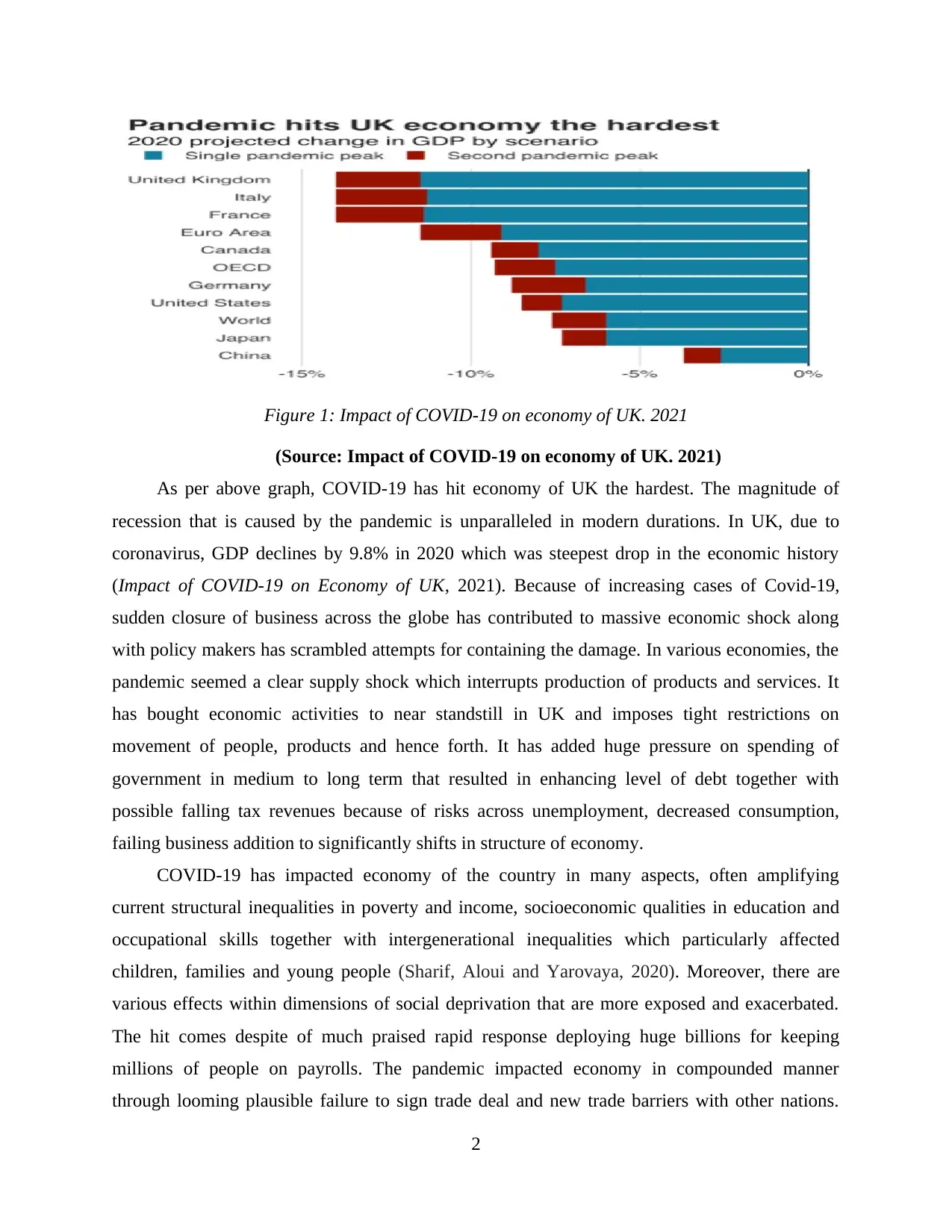
Figure 1: Impact of COVID-19 on economy of UK. 2021
(Source: Impact of COVID-19 on economy of UK. 2021)
As per above graph, COVID-19 has hit economy of UK the hardest. The magnitude of
recession that is caused by the pandemic is unparalleled in modern durations. In UK, due to
coronavirus, GDP declines by 9.8% in 2020 which was steepest drop in the economic history
(Impact of COVID-19 on Economy of UK, 2021). Because of increasing cases of Covid-19,
sudden closure of business across the globe has contributed to massive economic shock along
with policy makers has scrambled attempts for containing the damage. In various economies, the
pandemic seemed a clear supply shock which interrupts production of products and services. It
has bought economic activities to near standstill in UK and imposes tight restrictions on
movement of people, products and hence forth. It has added huge pressure on spending of
government in medium to long term that resulted in enhancing level of debt together with
possible falling tax revenues because of risks across unemployment, decreased consumption,
failing business addition to significantly shifts in structure of economy.
COVID-19 has impacted economy of the country in many aspects, often amplifying
current structural inequalities in poverty and income, socioeconomic qualities in education and
occupational skills together with intergenerational inequalities which particularly affected
children, families and young people (Sharif, Aloui and Yarovaya, 2020). Moreover, there are
various effects within dimensions of social deprivation that are more exposed and exacerbated.
The hit comes despite of much praised rapid response deploying huge billions for keeping
millions of people on payrolls. The pandemic impacted economy in compounded manner
through looming plausible failure to sign trade deal and new trade barriers with other nations.
2
(Source: Impact of COVID-19 on economy of UK. 2021)
As per above graph, COVID-19 has hit economy of UK the hardest. The magnitude of
recession that is caused by the pandemic is unparalleled in modern durations. In UK, due to
coronavirus, GDP declines by 9.8% in 2020 which was steepest drop in the economic history
(Impact of COVID-19 on Economy of UK, 2021). Because of increasing cases of Covid-19,
sudden closure of business across the globe has contributed to massive economic shock along
with policy makers has scrambled attempts for containing the damage. In various economies, the
pandemic seemed a clear supply shock which interrupts production of products and services. It
has bought economic activities to near standstill in UK and imposes tight restrictions on
movement of people, products and hence forth. It has added huge pressure on spending of
government in medium to long term that resulted in enhancing level of debt together with
possible falling tax revenues because of risks across unemployment, decreased consumption,
failing business addition to significantly shifts in structure of economy.
COVID-19 has impacted economy of the country in many aspects, often amplifying
current structural inequalities in poverty and income, socioeconomic qualities in education and
occupational skills together with intergenerational inequalities which particularly affected
children, families and young people (Sharif, Aloui and Yarovaya, 2020). Moreover, there are
various effects within dimensions of social deprivation that are more exposed and exacerbated.
The hit comes despite of much praised rapid response deploying huge billions for keeping
millions of people on payrolls. The pandemic impacted economy in compounded manner
through looming plausible failure to sign trade deal and new trade barriers with other nations.
2
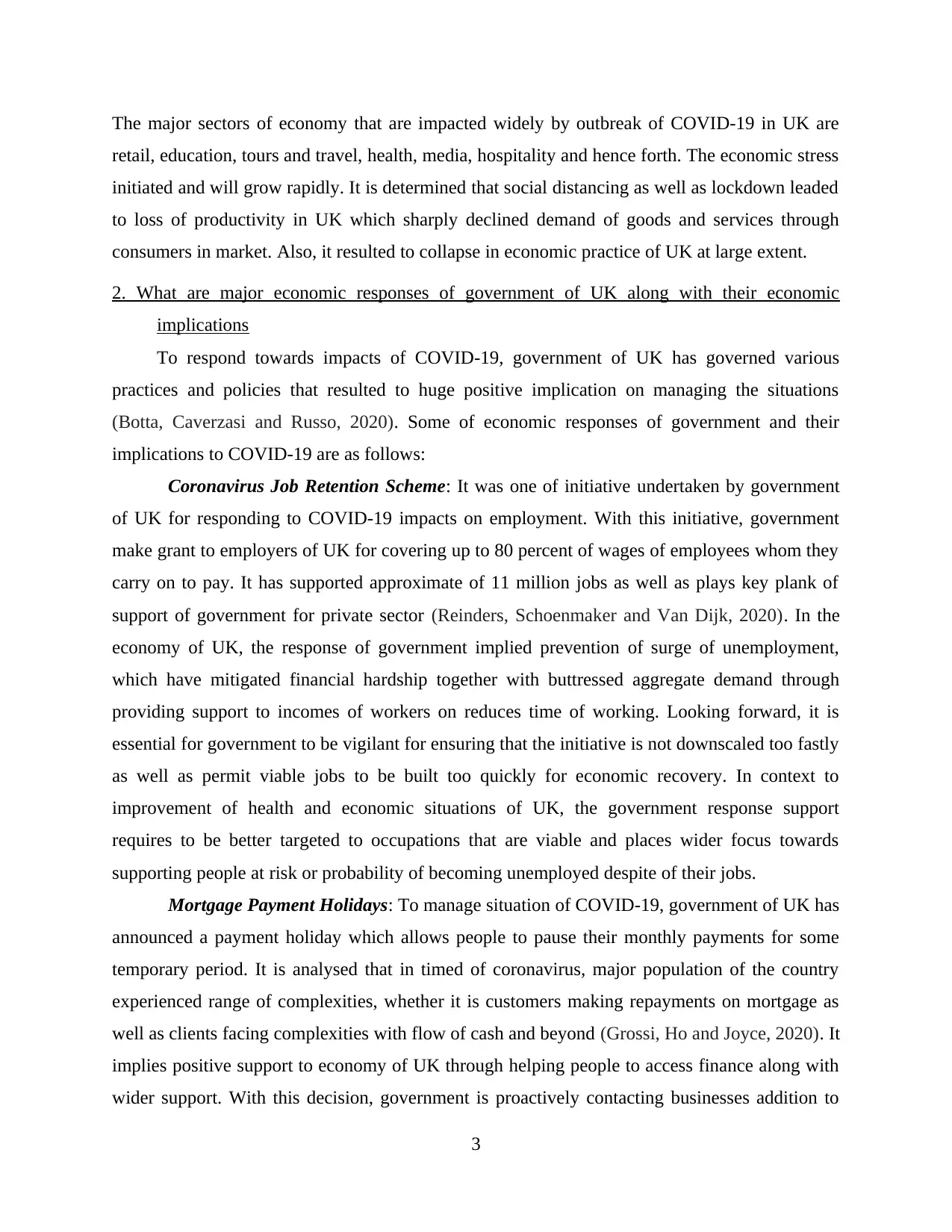
The major sectors of economy that are impacted widely by outbreak of COVID-19 in UK are
retail, education, tours and travel, health, media, hospitality and hence forth. The economic stress
initiated and will grow rapidly. It is determined that social distancing as well as lockdown leaded
to loss of productivity in UK which sharply declined demand of goods and services through
consumers in market. Also, it resulted to collapse in economic practice of UK at large extent.
2. What are major economic responses of government of UK along with their economic
implications
To respond towards impacts of COVID-19, government of UK has governed various
practices and policies that resulted to huge positive implication on managing the situations
(Botta, Caverzasi and Russo, 2020). Some of economic responses of government and their
implications to COVID-19 are as follows:
Coronavirus Job Retention Scheme: It was one of initiative undertaken by government
of UK for responding to COVID-19 impacts on employment. With this initiative, government
make grant to employers of UK for covering up to 80 percent of wages of employees whom they
carry on to pay. It has supported approximate of 11 million jobs as well as plays key plank of
support of government for private sector (Reinders, Schoenmaker and Van Dijk, 2020). In the
economy of UK, the response of government implied prevention of surge of unemployment,
which have mitigated financial hardship together with buttressed aggregate demand through
providing support to incomes of workers on reduces time of working. Looking forward, it is
essential for government to be vigilant for ensuring that the initiative is not downscaled too fastly
as well as permit viable jobs to be built too quickly for economic recovery. In context to
improvement of health and economic situations of UK, the government response support
requires to be better targeted to occupations that are viable and places wider focus towards
supporting people at risk or probability of becoming unemployed despite of their jobs.
Mortgage Payment Holidays: To manage situation of COVID-19, government of UK has
announced a payment holiday which allows people to pause their monthly payments for some
temporary period. It is analysed that in timed of coronavirus, major population of the country
experienced range of complexities, whether it is customers making repayments on mortgage as
well as clients facing complexities with flow of cash and beyond (Grossi, Ho and Joyce, 2020). It
implies positive support to economy of UK through helping people to access finance along with
wider support. With this decision, government is proactively contacting businesses addition to
3
retail, education, tours and travel, health, media, hospitality and hence forth. The economic stress
initiated and will grow rapidly. It is determined that social distancing as well as lockdown leaded
to loss of productivity in UK which sharply declined demand of goods and services through
consumers in market. Also, it resulted to collapse in economic practice of UK at large extent.
2. What are major economic responses of government of UK along with their economic
implications
To respond towards impacts of COVID-19, government of UK has governed various
practices and policies that resulted to huge positive implication on managing the situations
(Botta, Caverzasi and Russo, 2020). Some of economic responses of government and their
implications to COVID-19 are as follows:
Coronavirus Job Retention Scheme: It was one of initiative undertaken by government
of UK for responding to COVID-19 impacts on employment. With this initiative, government
make grant to employers of UK for covering up to 80 percent of wages of employees whom they
carry on to pay. It has supported approximate of 11 million jobs as well as plays key plank of
support of government for private sector (Reinders, Schoenmaker and Van Dijk, 2020). In the
economy of UK, the response of government implied prevention of surge of unemployment,
which have mitigated financial hardship together with buttressed aggregate demand through
providing support to incomes of workers on reduces time of working. Looking forward, it is
essential for government to be vigilant for ensuring that the initiative is not downscaled too fastly
as well as permit viable jobs to be built too quickly for economic recovery. In context to
improvement of health and economic situations of UK, the government response support
requires to be better targeted to occupations that are viable and places wider focus towards
supporting people at risk or probability of becoming unemployed despite of their jobs.
Mortgage Payment Holidays: To manage situation of COVID-19, government of UK has
announced a payment holiday which allows people to pause their monthly payments for some
temporary period. It is analysed that in timed of coronavirus, major population of the country
experienced range of complexities, whether it is customers making repayments on mortgage as
well as clients facing complexities with flow of cash and beyond (Grossi, Ho and Joyce, 2020). It
implies positive support to economy of UK through helping people to access finance along with
wider support. With this decision, government is proactively contacting businesses addition to
3
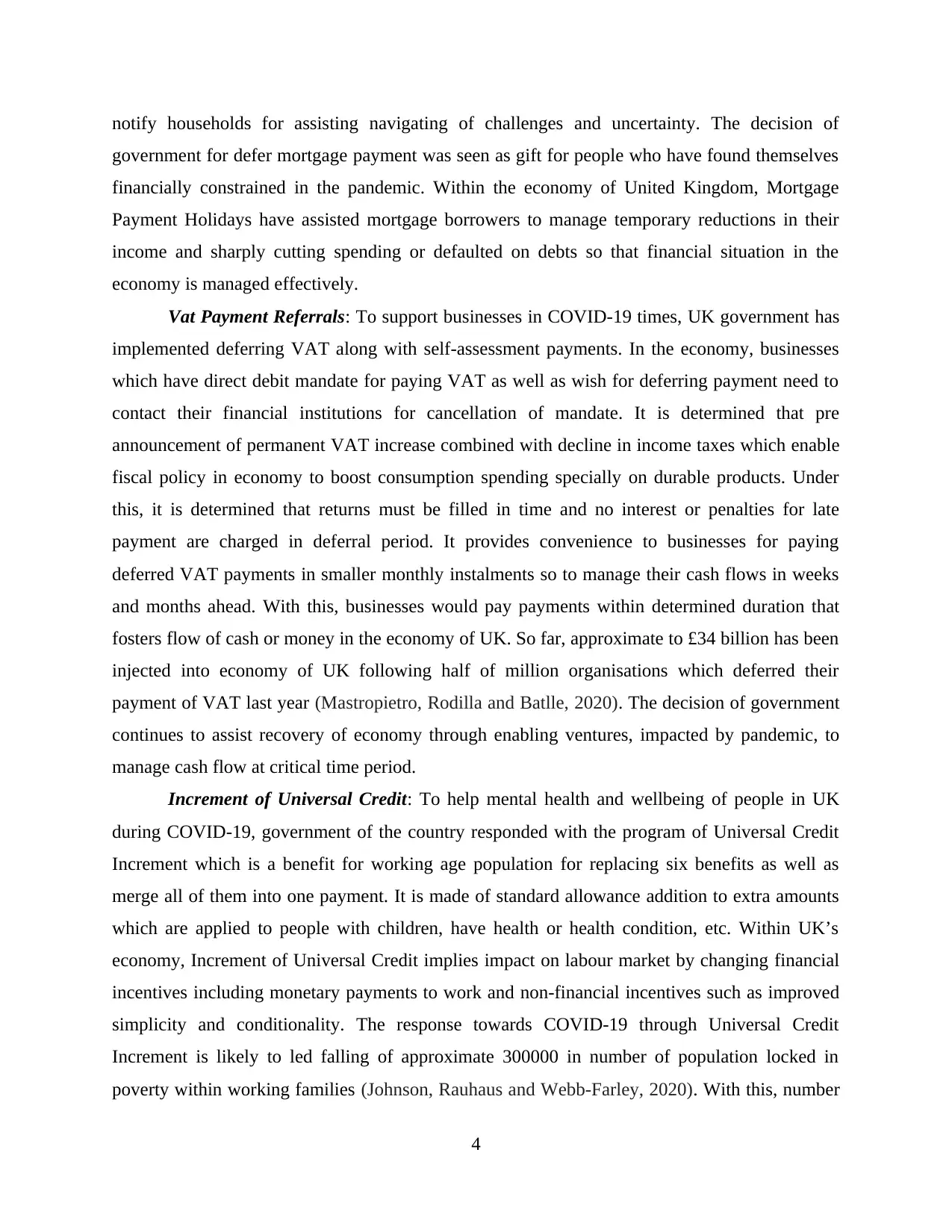
notify households for assisting navigating of challenges and uncertainty. The decision of
government for defer mortgage payment was seen as gift for people who have found themselves
financially constrained in the pandemic. Within the economy of United Kingdom, Mortgage
Payment Holidays have assisted mortgage borrowers to manage temporary reductions in their
income and sharply cutting spending or defaulted on debts so that financial situation in the
economy is managed effectively.
Vat Payment Referrals: To support businesses in COVID-19 times, UK government has
implemented deferring VAT along with self-assessment payments. In the economy, businesses
which have direct debit mandate for paying VAT as well as wish for deferring payment need to
contact their financial institutions for cancellation of mandate. It is determined that pre
announcement of permanent VAT increase combined with decline in income taxes which enable
fiscal policy in economy to boost consumption spending specially on durable products. Under
this, it is determined that returns must be filled in time and no interest or penalties for late
payment are charged in deferral period. It provides convenience to businesses for paying
deferred VAT payments in smaller monthly instalments so to manage their cash flows in weeks
and months ahead. With this, businesses would pay payments within determined duration that
fosters flow of cash or money in the economy of UK. So far, approximate to £34 billion has been
injected into economy of UK following half of million organisations which deferred their
payment of VAT last year (Mastropietro, Rodilla and Batlle, 2020). The decision of government
continues to assist recovery of economy through enabling ventures, impacted by pandemic, to
manage cash flow at critical time period.
Increment of Universal Credit: To help mental health and wellbeing of people in UK
during COVID-19, government of the country responded with the program of Universal Credit
Increment which is a benefit for working age population for replacing six benefits as well as
merge all of them into one payment. It is made of standard allowance addition to extra amounts
which are applied to people with children, have health or health condition, etc. Within UK’s
economy, Increment of Universal Credit implies impact on labour market by changing financial
incentives including monetary payments to work and non-financial incentives such as improved
simplicity and conditionality. The response towards COVID-19 through Universal Credit
Increment is likely to led falling of approximate 300000 in number of population locked in
poverty within working families (Johnson, Rauhaus and Webb-Farley, 2020). With this, number
4
government for defer mortgage payment was seen as gift for people who have found themselves
financially constrained in the pandemic. Within the economy of United Kingdom, Mortgage
Payment Holidays have assisted mortgage borrowers to manage temporary reductions in their
income and sharply cutting spending or defaulted on debts so that financial situation in the
economy is managed effectively.
Vat Payment Referrals: To support businesses in COVID-19 times, UK government has
implemented deferring VAT along with self-assessment payments. In the economy, businesses
which have direct debit mandate for paying VAT as well as wish for deferring payment need to
contact their financial institutions for cancellation of mandate. It is determined that pre
announcement of permanent VAT increase combined with decline in income taxes which enable
fiscal policy in economy to boost consumption spending specially on durable products. Under
this, it is determined that returns must be filled in time and no interest or penalties for late
payment are charged in deferral period. It provides convenience to businesses for paying
deferred VAT payments in smaller monthly instalments so to manage their cash flows in weeks
and months ahead. With this, businesses would pay payments within determined duration that
fosters flow of cash or money in the economy of UK. So far, approximate to £34 billion has been
injected into economy of UK following half of million organisations which deferred their
payment of VAT last year (Mastropietro, Rodilla and Batlle, 2020). The decision of government
continues to assist recovery of economy through enabling ventures, impacted by pandemic, to
manage cash flow at critical time period.
Increment of Universal Credit: To help mental health and wellbeing of people in UK
during COVID-19, government of the country responded with the program of Universal Credit
Increment which is a benefit for working age population for replacing six benefits as well as
merge all of them into one payment. It is made of standard allowance addition to extra amounts
which are applied to people with children, have health or health condition, etc. Within UK’s
economy, Increment of Universal Credit implies impact on labour market by changing financial
incentives including monetary payments to work and non-financial incentives such as improved
simplicity and conditionality. The response towards COVID-19 through Universal Credit
Increment is likely to led falling of approximate 300000 in number of population locked in
poverty within working families (Johnson, Rauhaus and Webb-Farley, 2020). With this, number
4
Paraphrase This Document
Need a fresh take? Get an instant paraphrase of this document with our AI Paraphraser
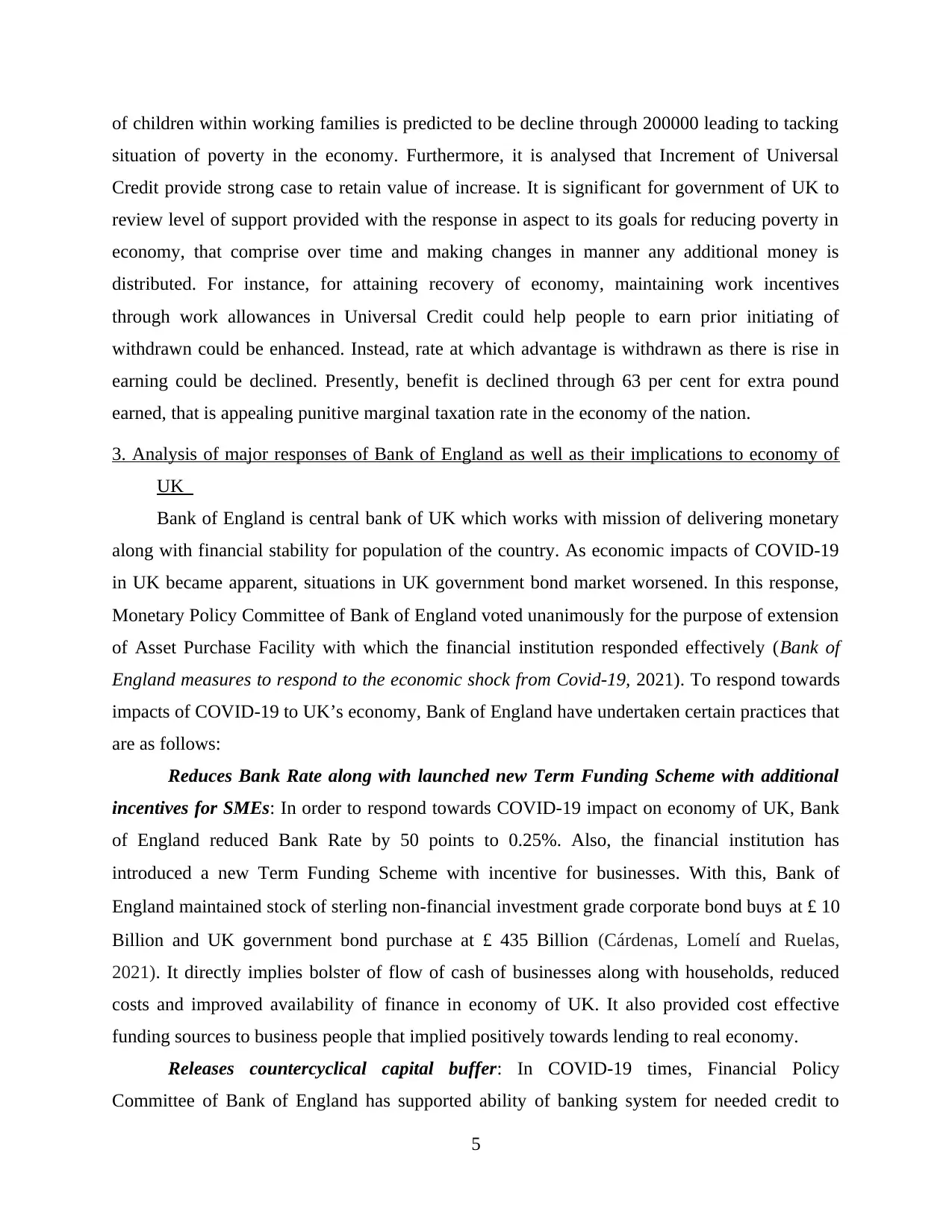
of children within working families is predicted to be decline through 200000 leading to tacking
situation of poverty in the economy. Furthermore, it is analysed that Increment of Universal
Credit provide strong case to retain value of increase. It is significant for government of UK to
review level of support provided with the response in aspect to its goals for reducing poverty in
economy, that comprise over time and making changes in manner any additional money is
distributed. For instance, for attaining recovery of economy, maintaining work incentives
through work allowances in Universal Credit could help people to earn prior initiating of
withdrawn could be enhanced. Instead, rate at which advantage is withdrawn as there is rise in
earning could be declined. Presently, benefit is declined through 63 per cent for extra pound
earned, that is appealing punitive marginal taxation rate in the economy of the nation.
3. Analysis of major responses of Bank of England as well as their implications to economy of
UK
Bank of England is central bank of UK which works with mission of delivering monetary
along with financial stability for population of the country. As economic impacts of COVID-19
in UK became apparent, situations in UK government bond market worsened. In this response,
Monetary Policy Committee of Bank of England voted unanimously for the purpose of extension
of Asset Purchase Facility with which the financial institution responded effectively (Bank of
England measures to respond to the economic shock from Covid-19, 2021). To respond towards
impacts of COVID-19 to UK’s economy, Bank of England have undertaken certain practices that
are as follows:
Reduces Bank Rate along with launched new Term Funding Scheme with additional
incentives for SMEs: In order to respond towards COVID-19 impact on economy of UK, Bank
of England reduced Bank Rate by 50 points to 0.25%. Also, the financial institution has
introduced a new Term Funding Scheme with incentive for businesses. With this, Bank of
England maintained stock of sterling non-financial investment grade corporate bond buys at £ 10
Billion and UK government bond purchase at £ 435 Billion (Cárdenas, Lomelí and Ruelas,
2021). It directly implies bolster of flow of cash of businesses along with households, reduced
costs and improved availability of finance in economy of UK. It also provided cost effective
funding sources to business people that implied positively towards lending to real economy.
Releases countercyclical capital buffer: In COVID-19 times, Financial Policy
Committee of Bank of England has supported ability of banking system for needed credit to
5
situation of poverty in the economy. Furthermore, it is analysed that Increment of Universal
Credit provide strong case to retain value of increase. It is significant for government of UK to
review level of support provided with the response in aspect to its goals for reducing poverty in
economy, that comprise over time and making changes in manner any additional money is
distributed. For instance, for attaining recovery of economy, maintaining work incentives
through work allowances in Universal Credit could help people to earn prior initiating of
withdrawn could be enhanced. Instead, rate at which advantage is withdrawn as there is rise in
earning could be declined. Presently, benefit is declined through 63 per cent for extra pound
earned, that is appealing punitive marginal taxation rate in the economy of the nation.
3. Analysis of major responses of Bank of England as well as their implications to economy of
UK
Bank of England is central bank of UK which works with mission of delivering monetary
along with financial stability for population of the country. As economic impacts of COVID-19
in UK became apparent, situations in UK government bond market worsened. In this response,
Monetary Policy Committee of Bank of England voted unanimously for the purpose of extension
of Asset Purchase Facility with which the financial institution responded effectively (Bank of
England measures to respond to the economic shock from Covid-19, 2021). To respond towards
impacts of COVID-19 to UK’s economy, Bank of England have undertaken certain practices that
are as follows:
Reduces Bank Rate along with launched new Term Funding Scheme with additional
incentives for SMEs: In order to respond towards COVID-19 impact on economy of UK, Bank
of England reduced Bank Rate by 50 points to 0.25%. Also, the financial institution has
introduced a new Term Funding Scheme with incentive for businesses. With this, Bank of
England maintained stock of sterling non-financial investment grade corporate bond buys at £ 10
Billion and UK government bond purchase at £ 435 Billion (Cárdenas, Lomelí and Ruelas,
2021). It directly implies bolster of flow of cash of businesses along with households, reduced
costs and improved availability of finance in economy of UK. It also provided cost effective
funding sources to business people that implied positively towards lending to real economy.
Releases countercyclical capital buffer: In COVID-19 times, Financial Policy
Committee of Bank of England has supported ability of banking system for needed credit to
5
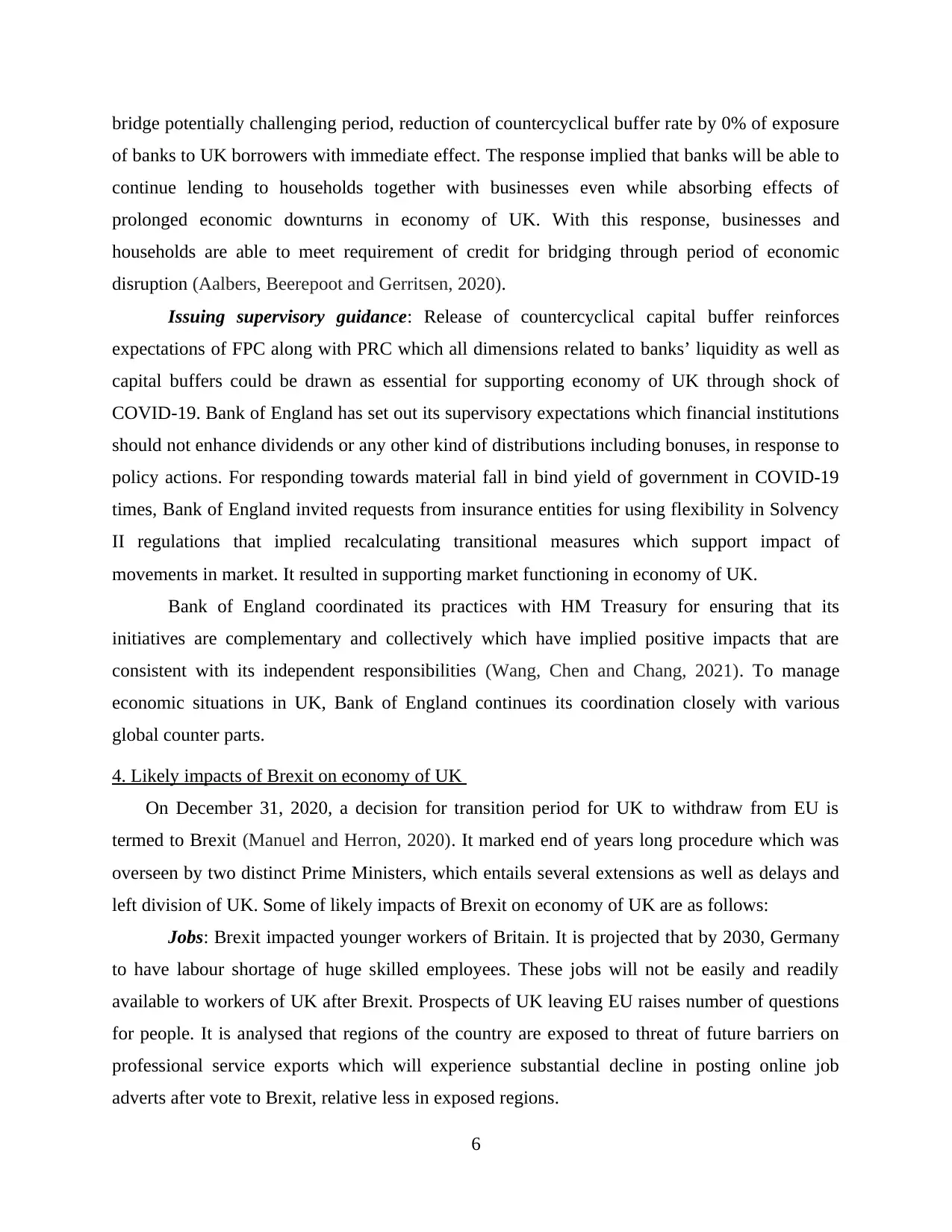
bridge potentially challenging period, reduction of countercyclical buffer rate by 0% of exposure
of banks to UK borrowers with immediate effect. The response implied that banks will be able to
continue lending to households together with businesses even while absorbing effects of
prolonged economic downturns in economy of UK. With this response, businesses and
households are able to meet requirement of credit for bridging through period of economic
disruption (Aalbers, Beerepoot and Gerritsen, 2020).
Issuing supervisory guidance: Release of countercyclical capital buffer reinforces
expectations of FPC along with PRC which all dimensions related to banks’ liquidity as well as
capital buffers could be drawn as essential for supporting economy of UK through shock of
COVID-19. Bank of England has set out its supervisory expectations which financial institutions
should not enhance dividends or any other kind of distributions including bonuses, in response to
policy actions. For responding towards material fall in bind yield of government in COVID-19
times, Bank of England invited requests from insurance entities for using flexibility in Solvency
II regulations that implied recalculating transitional measures which support impact of
movements in market. It resulted in supporting market functioning in economy of UK.
Bank of England coordinated its practices with HM Treasury for ensuring that its
initiatives are complementary and collectively which have implied positive impacts that are
consistent with its independent responsibilities (Wang, Chen and Chang, 2021). To manage
economic situations in UK, Bank of England continues its coordination closely with various
global counter parts.
4. Likely impacts of Brexit on economy of UK
On December 31, 2020, a decision for transition period for UK to withdraw from EU is
termed to Brexit (Manuel and Herron, 2020). It marked end of years long procedure which was
overseen by two distinct Prime Ministers, which entails several extensions as well as delays and
left division of UK. Some of likely impacts of Brexit on economy of UK are as follows:
Jobs: Brexit impacted younger workers of Britain. It is projected that by 2030, Germany
to have labour shortage of huge skilled employees. These jobs will not be easily and readily
available to workers of UK after Brexit. Prospects of UK leaving EU raises number of questions
for people. It is analysed that regions of the country are exposed to threat of future barriers on
professional service exports which will experience substantial decline in posting online job
adverts after vote to Brexit, relative less in exposed regions.
6
of banks to UK borrowers with immediate effect. The response implied that banks will be able to
continue lending to households together with businesses even while absorbing effects of
prolonged economic downturns in economy of UK. With this response, businesses and
households are able to meet requirement of credit for bridging through period of economic
disruption (Aalbers, Beerepoot and Gerritsen, 2020).
Issuing supervisory guidance: Release of countercyclical capital buffer reinforces
expectations of FPC along with PRC which all dimensions related to banks’ liquidity as well as
capital buffers could be drawn as essential for supporting economy of UK through shock of
COVID-19. Bank of England has set out its supervisory expectations which financial institutions
should not enhance dividends or any other kind of distributions including bonuses, in response to
policy actions. For responding towards material fall in bind yield of government in COVID-19
times, Bank of England invited requests from insurance entities for using flexibility in Solvency
II regulations that implied recalculating transitional measures which support impact of
movements in market. It resulted in supporting market functioning in economy of UK.
Bank of England coordinated its practices with HM Treasury for ensuring that its
initiatives are complementary and collectively which have implied positive impacts that are
consistent with its independent responsibilities (Wang, Chen and Chang, 2021). To manage
economic situations in UK, Bank of England continues its coordination closely with various
global counter parts.
4. Likely impacts of Brexit on economy of UK
On December 31, 2020, a decision for transition period for UK to withdraw from EU is
termed to Brexit (Manuel and Herron, 2020). It marked end of years long procedure which was
overseen by two distinct Prime Ministers, which entails several extensions as well as delays and
left division of UK. Some of likely impacts of Brexit on economy of UK are as follows:
Jobs: Brexit impacted younger workers of Britain. It is projected that by 2030, Germany
to have labour shortage of huge skilled employees. These jobs will not be easily and readily
available to workers of UK after Brexit. Prospects of UK leaving EU raises number of questions
for people. It is analysed that regions of the country are exposed to threat of future barriers on
professional service exports which will experience substantial decline in posting online job
adverts after vote to Brexit, relative less in exposed regions.
6
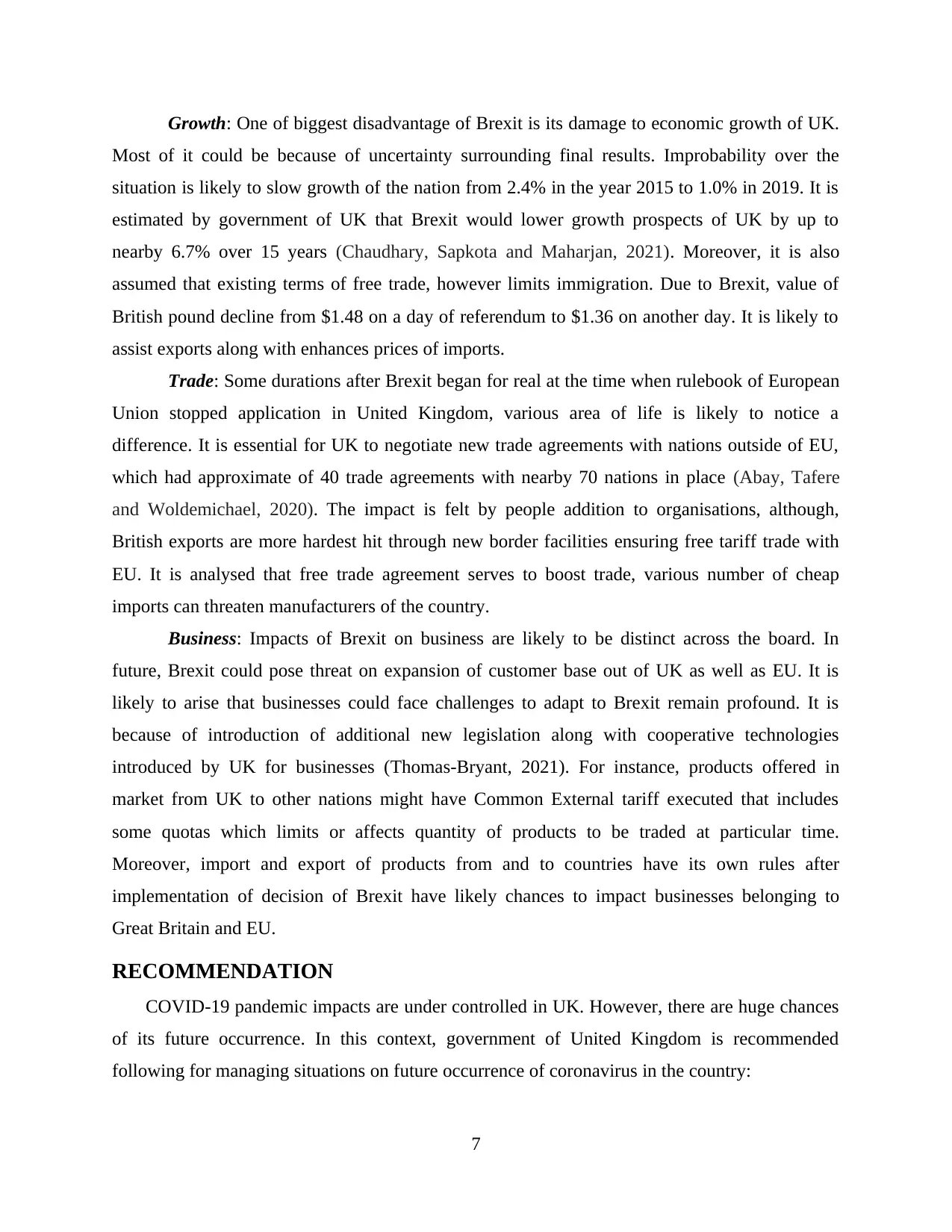
Growth: One of biggest disadvantage of Brexit is its damage to economic growth of UK.
Most of it could be because of uncertainty surrounding final results. Improbability over the
situation is likely to slow growth of the nation from 2.4% in the year 2015 to 1.0% in 2019. It is
estimated by government of UK that Brexit would lower growth prospects of UK by up to
nearby 6.7% over 15 years (Chaudhary, Sapkota and Maharjan, 2021). Moreover, it is also
assumed that existing terms of free trade, however limits immigration. Due to Brexit, value of
British pound decline from $1.48 on a day of referendum to $1.36 on another day. It is likely to
assist exports along with enhances prices of imports.
Trade: Some durations after Brexit began for real at the time when rulebook of European
Union stopped application in United Kingdom, various area of life is likely to notice a
difference. It is essential for UK to negotiate new trade agreements with nations outside of EU,
which had approximate of 40 trade agreements with nearby 70 nations in place (Abay, Tafere
and Woldemichael, 2020). The impact is felt by people addition to organisations, although,
British exports are more hardest hit through new border facilities ensuring free tariff trade with
EU. It is analysed that free trade agreement serves to boost trade, various number of cheap
imports can threaten manufacturers of the country.
Business: Impacts of Brexit on business are likely to be distinct across the board. In
future, Brexit could pose threat on expansion of customer base out of UK as well as EU. It is
likely to arise that businesses could face challenges to adapt to Brexit remain profound. It is
because of introduction of additional new legislation along with cooperative technologies
introduced by UK for businesses (Thomas-Bryant, 2021). For instance, products offered in
market from UK to other nations might have Common External tariff executed that includes
some quotas which limits or affects quantity of products to be traded at particular time.
Moreover, import and export of products from and to countries have its own rules after
implementation of decision of Brexit have likely chances to impact businesses belonging to
Great Britain and EU.
RECOMMENDATION
COVID-19 pandemic impacts are under controlled in UK. However, there are huge chances
of its future occurrence. In this context, government of United Kingdom is recommended
following for managing situations on future occurrence of coronavirus in the country:
7
Most of it could be because of uncertainty surrounding final results. Improbability over the
situation is likely to slow growth of the nation from 2.4% in the year 2015 to 1.0% in 2019. It is
estimated by government of UK that Brexit would lower growth prospects of UK by up to
nearby 6.7% over 15 years (Chaudhary, Sapkota and Maharjan, 2021). Moreover, it is also
assumed that existing terms of free trade, however limits immigration. Due to Brexit, value of
British pound decline from $1.48 on a day of referendum to $1.36 on another day. It is likely to
assist exports along with enhances prices of imports.
Trade: Some durations after Brexit began for real at the time when rulebook of European
Union stopped application in United Kingdom, various area of life is likely to notice a
difference. It is essential for UK to negotiate new trade agreements with nations outside of EU,
which had approximate of 40 trade agreements with nearby 70 nations in place (Abay, Tafere
and Woldemichael, 2020). The impact is felt by people addition to organisations, although,
British exports are more hardest hit through new border facilities ensuring free tariff trade with
EU. It is analysed that free trade agreement serves to boost trade, various number of cheap
imports can threaten manufacturers of the country.
Business: Impacts of Brexit on business are likely to be distinct across the board. In
future, Brexit could pose threat on expansion of customer base out of UK as well as EU. It is
likely to arise that businesses could face challenges to adapt to Brexit remain profound. It is
because of introduction of additional new legislation along with cooperative technologies
introduced by UK for businesses (Thomas-Bryant, 2021). For instance, products offered in
market from UK to other nations might have Common External tariff executed that includes
some quotas which limits or affects quantity of products to be traded at particular time.
Moreover, import and export of products from and to countries have its own rules after
implementation of decision of Brexit have likely chances to impact businesses belonging to
Great Britain and EU.
RECOMMENDATION
COVID-19 pandemic impacts are under controlled in UK. However, there are huge chances
of its future occurrence. In this context, government of United Kingdom is recommended
following for managing situations on future occurrence of coronavirus in the country:
7
Secure Best Marks with AI Grader
Need help grading? Try our AI Grader for instant feedback on your assignments.
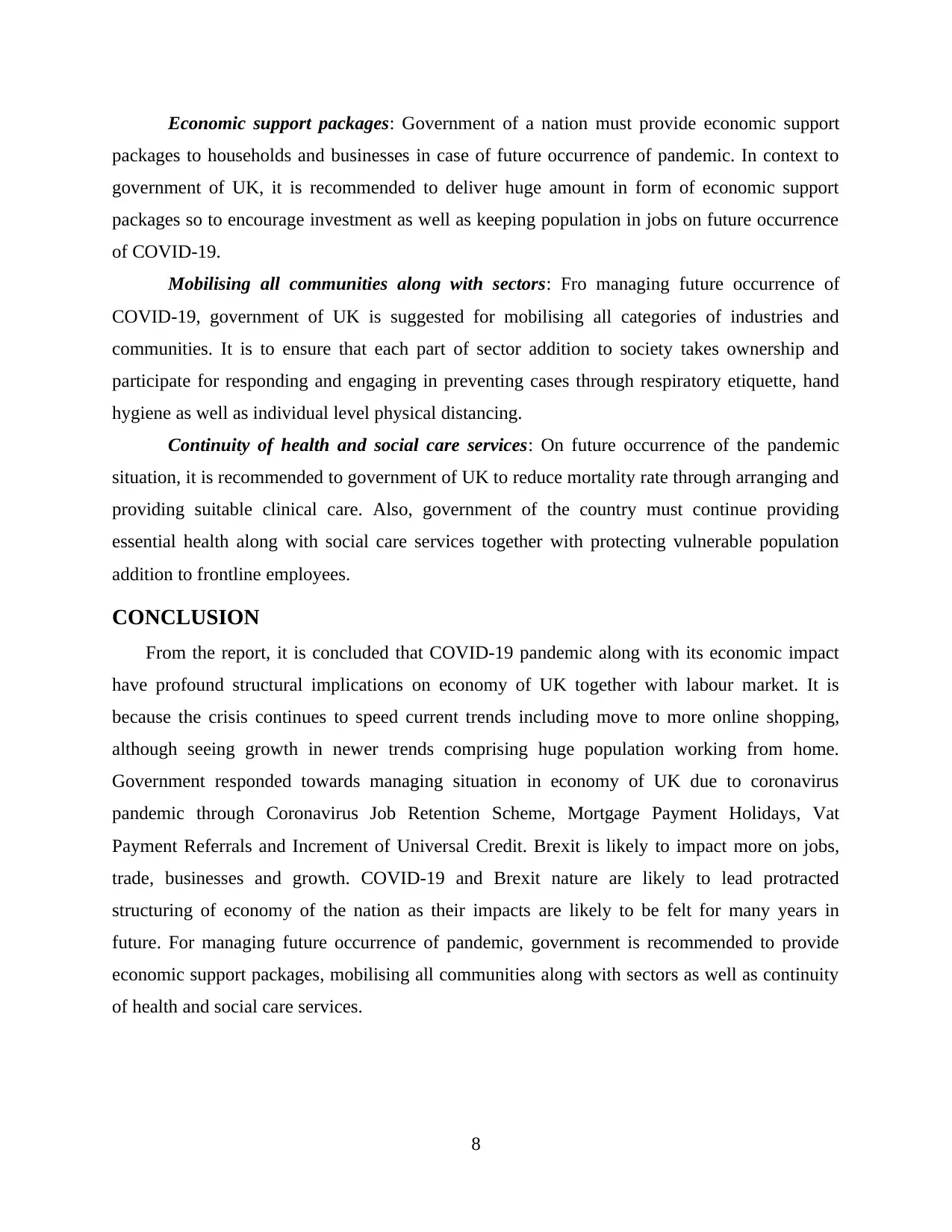
Economic support packages: Government of a nation must provide economic support
packages to households and businesses in case of future occurrence of pandemic. In context to
government of UK, it is recommended to deliver huge amount in form of economic support
packages so to encourage investment as well as keeping population in jobs on future occurrence
of COVID-19.
Mobilising all communities along with sectors: Fro managing future occurrence of
COVID-19, government of UK is suggested for mobilising all categories of industries and
communities. It is to ensure that each part of sector addition to society takes ownership and
participate for responding and engaging in preventing cases through respiratory etiquette, hand
hygiene as well as individual level physical distancing.
Continuity of health and social care services: On future occurrence of the pandemic
situation, it is recommended to government of UK to reduce mortality rate through arranging and
providing suitable clinical care. Also, government of the country must continue providing
essential health along with social care services together with protecting vulnerable population
addition to frontline employees.
CONCLUSION
From the report, it is concluded that COVID-19 pandemic along with its economic impact
have profound structural implications on economy of UK together with labour market. It is
because the crisis continues to speed current trends including move to more online shopping,
although seeing growth in newer trends comprising huge population working from home.
Government responded towards managing situation in economy of UK due to coronavirus
pandemic through Coronavirus Job Retention Scheme, Mortgage Payment Holidays, Vat
Payment Referrals and Increment of Universal Credit. Brexit is likely to impact more on jobs,
trade, businesses and growth. COVID-19 and Brexit nature are likely to lead protracted
structuring of economy of the nation as their impacts are likely to be felt for many years in
future. For managing future occurrence of pandemic, government is recommended to provide
economic support packages, mobilising all communities along with sectors as well as continuity
of health and social care services.
8
packages to households and businesses in case of future occurrence of pandemic. In context to
government of UK, it is recommended to deliver huge amount in form of economic support
packages so to encourage investment as well as keeping population in jobs on future occurrence
of COVID-19.
Mobilising all communities along with sectors: Fro managing future occurrence of
COVID-19, government of UK is suggested for mobilising all categories of industries and
communities. It is to ensure that each part of sector addition to society takes ownership and
participate for responding and engaging in preventing cases through respiratory etiquette, hand
hygiene as well as individual level physical distancing.
Continuity of health and social care services: On future occurrence of the pandemic
situation, it is recommended to government of UK to reduce mortality rate through arranging and
providing suitable clinical care. Also, government of the country must continue providing
essential health along with social care services together with protecting vulnerable population
addition to frontline employees.
CONCLUSION
From the report, it is concluded that COVID-19 pandemic along with its economic impact
have profound structural implications on economy of UK together with labour market. It is
because the crisis continues to speed current trends including move to more online shopping,
although seeing growth in newer trends comprising huge population working from home.
Government responded towards managing situation in economy of UK due to coronavirus
pandemic through Coronavirus Job Retention Scheme, Mortgage Payment Holidays, Vat
Payment Referrals and Increment of Universal Credit. Brexit is likely to impact more on jobs,
trade, businesses and growth. COVID-19 and Brexit nature are likely to lead protracted
structuring of economy of the nation as their impacts are likely to be felt for many years in
future. For managing future occurrence of pandemic, government is recommended to provide
economic support packages, mobilising all communities along with sectors as well as continuity
of health and social care services.
8
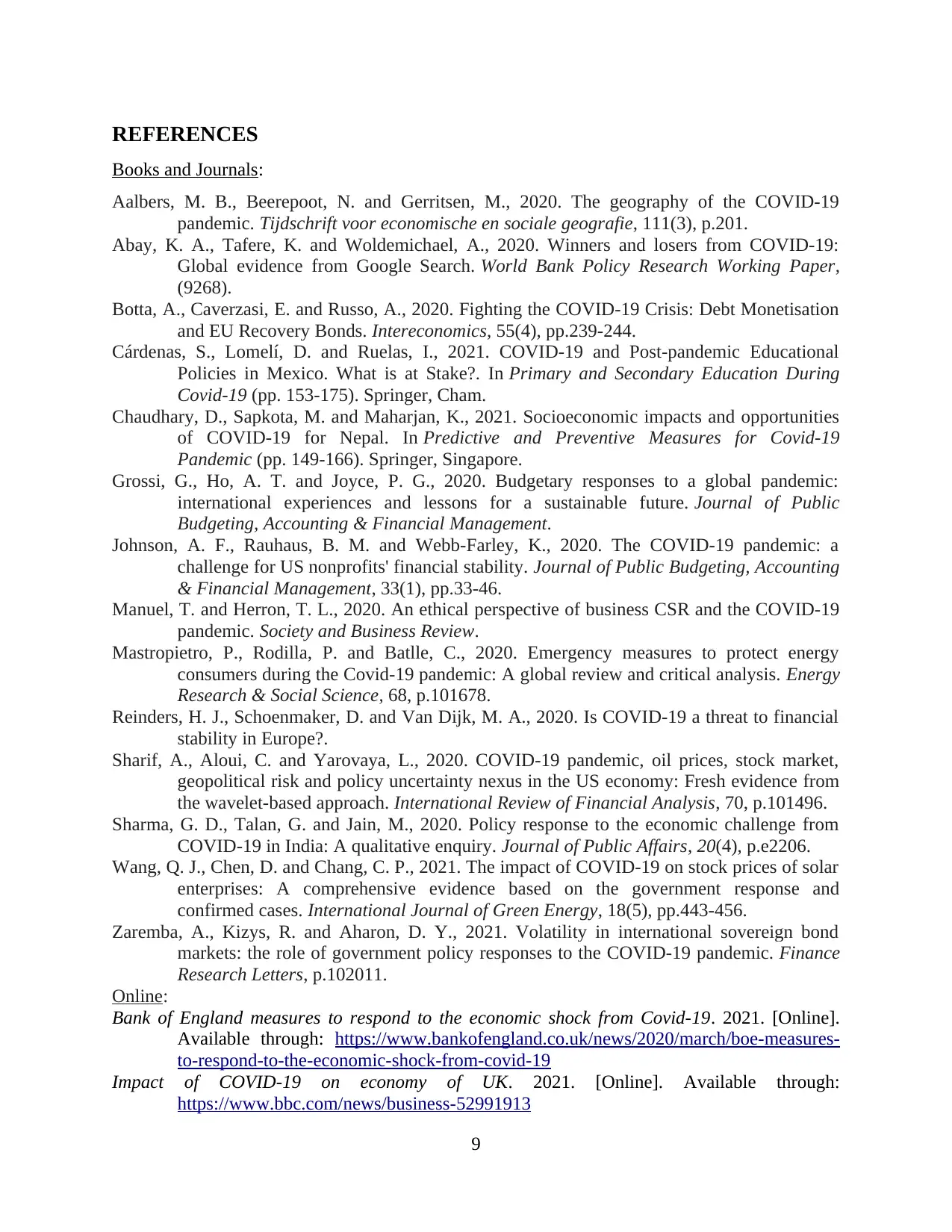
REFERENCES
Books and Journals:
Aalbers, M. B., Beerepoot, N. and Gerritsen, M., 2020. The geography of the COVID‐19
pandemic. Tijdschrift voor economische en sociale geografie, 111(3), p.201.
Abay, K. A., Tafere, K. and Woldemichael, A., 2020. Winners and losers from COVID-19:
Global evidence from Google Search. World Bank Policy Research Working Paper,
(9268).
Botta, A., Caverzasi, E. and Russo, A., 2020. Fighting the COVID-19 Crisis: Debt Monetisation
and EU Recovery Bonds. Intereconomics, 55(4), pp.239-244.
Cárdenas, S., Lomelí, D. and Ruelas, I., 2021. COVID-19 and Post-pandemic Educational
Policies in Mexico. What is at Stake?. In Primary and Secondary Education During
Covid-19 (pp. 153-175). Springer, Cham.
Chaudhary, D., Sapkota, M. and Maharjan, K., 2021. Socioeconomic impacts and opportunities
of COVID-19 for Nepal. In Predictive and Preventive Measures for Covid-19
Pandemic (pp. 149-166). Springer, Singapore.
Grossi, G., Ho, A. T. and Joyce, P. G., 2020. Budgetary responses to a global pandemic:
international experiences and lessons for a sustainable future. Journal of Public
Budgeting, Accounting & Financial Management.
Johnson, A. F., Rauhaus, B. M. and Webb-Farley, K., 2020. The COVID-19 pandemic: a
challenge for US nonprofits' financial stability. Journal of Public Budgeting, Accounting
& Financial Management, 33(1), pp.33-46.
Manuel, T. and Herron, T. L., 2020. An ethical perspective of business CSR and the COVID-19
pandemic. Society and Business Review.
Mastropietro, P., Rodilla, P. and Batlle, C., 2020. Emergency measures to protect energy
consumers during the Covid-19 pandemic: A global review and critical analysis. Energy
Research & Social Science, 68, p.101678.
Reinders, H. J., Schoenmaker, D. and Van Dijk, M. A., 2020. Is COVID-19 a threat to financial
stability in Europe?.
Sharif, A., Aloui, C. and Yarovaya, L., 2020. COVID-19 pandemic, oil prices, stock market,
geopolitical risk and policy uncertainty nexus in the US economy: Fresh evidence from
the wavelet-based approach. International Review of Financial Analysis, 70, p.101496.
Sharma, G. D., Talan, G. and Jain, M., 2020. Policy response to the economic challenge from
COVID‐19 in India: A qualitative enquiry. Journal of Public Affairs, 20(4), p.e2206.
Wang, Q. J., Chen, D. and Chang, C. P., 2021. The impact of COVID-19 on stock prices of solar
enterprises: A comprehensive evidence based on the government response and
confirmed cases. International Journal of Green Energy, 18(5), pp.443-456.
Zaremba, A., Kizys, R. and Aharon, D. Y., 2021. Volatility in international sovereign bond
markets: the role of government policy responses to the COVID-19 pandemic. Finance
Research Letters, p.102011.
Online:
Bank of England measures to respond to the economic shock from Covid-19. 2021. [Online].
Available through: https://www.bankofengland.co.uk/news/2020/march/boe-measures-
to-respond-to-the-economic-shock-from-covid-19
Impact of COVID-19 on economy of UK. 2021. [Online]. Available through:
https://www.bbc.com/news/business-52991913
9
Books and Journals:
Aalbers, M. B., Beerepoot, N. and Gerritsen, M., 2020. The geography of the COVID‐19
pandemic. Tijdschrift voor economische en sociale geografie, 111(3), p.201.
Abay, K. A., Tafere, K. and Woldemichael, A., 2020. Winners and losers from COVID-19:
Global evidence from Google Search. World Bank Policy Research Working Paper,
(9268).
Botta, A., Caverzasi, E. and Russo, A., 2020. Fighting the COVID-19 Crisis: Debt Monetisation
and EU Recovery Bonds. Intereconomics, 55(4), pp.239-244.
Cárdenas, S., Lomelí, D. and Ruelas, I., 2021. COVID-19 and Post-pandemic Educational
Policies in Mexico. What is at Stake?. In Primary and Secondary Education During
Covid-19 (pp. 153-175). Springer, Cham.
Chaudhary, D., Sapkota, M. and Maharjan, K., 2021. Socioeconomic impacts and opportunities
of COVID-19 for Nepal. In Predictive and Preventive Measures for Covid-19
Pandemic (pp. 149-166). Springer, Singapore.
Grossi, G., Ho, A. T. and Joyce, P. G., 2020. Budgetary responses to a global pandemic:
international experiences and lessons for a sustainable future. Journal of Public
Budgeting, Accounting & Financial Management.
Johnson, A. F., Rauhaus, B. M. and Webb-Farley, K., 2020. The COVID-19 pandemic: a
challenge for US nonprofits' financial stability. Journal of Public Budgeting, Accounting
& Financial Management, 33(1), pp.33-46.
Manuel, T. and Herron, T. L., 2020. An ethical perspective of business CSR and the COVID-19
pandemic. Society and Business Review.
Mastropietro, P., Rodilla, P. and Batlle, C., 2020. Emergency measures to protect energy
consumers during the Covid-19 pandemic: A global review and critical analysis. Energy
Research & Social Science, 68, p.101678.
Reinders, H. J., Schoenmaker, D. and Van Dijk, M. A., 2020. Is COVID-19 a threat to financial
stability in Europe?.
Sharif, A., Aloui, C. and Yarovaya, L., 2020. COVID-19 pandemic, oil prices, stock market,
geopolitical risk and policy uncertainty nexus in the US economy: Fresh evidence from
the wavelet-based approach. International Review of Financial Analysis, 70, p.101496.
Sharma, G. D., Talan, G. and Jain, M., 2020. Policy response to the economic challenge from
COVID‐19 in India: A qualitative enquiry. Journal of Public Affairs, 20(4), p.e2206.
Wang, Q. J., Chen, D. and Chang, C. P., 2021. The impact of COVID-19 on stock prices of solar
enterprises: A comprehensive evidence based on the government response and
confirmed cases. International Journal of Green Energy, 18(5), pp.443-456.
Zaremba, A., Kizys, R. and Aharon, D. Y., 2021. Volatility in international sovereign bond
markets: the role of government policy responses to the COVID-19 pandemic. Finance
Research Letters, p.102011.
Online:
Bank of England measures to respond to the economic shock from Covid-19. 2021. [Online].
Available through: https://www.bankofengland.co.uk/news/2020/march/boe-measures-
to-respond-to-the-economic-shock-from-covid-19
Impact of COVID-19 on economy of UK. 2021. [Online]. Available through:
https://www.bbc.com/news/business-52991913
9

Thomas-Bryant. K. 2021. How Will Brexit Affect Businesses. [Online]. Available through:
<https://www.sage.com/en-gb/blog/how-will-brexit-affect-businesses/>
10
<https://www.sage.com/en-gb/blog/how-will-brexit-affect-businesses/>
10
1 out of 13
Related Documents
Your All-in-One AI-Powered Toolkit for Academic Success.
+13062052269
info@desklib.com
Available 24*7 on WhatsApp / Email
![[object Object]](/_next/static/media/star-bottom.7253800d.svg)
Unlock your academic potential
© 2024 | Zucol Services PVT LTD | All rights reserved.

